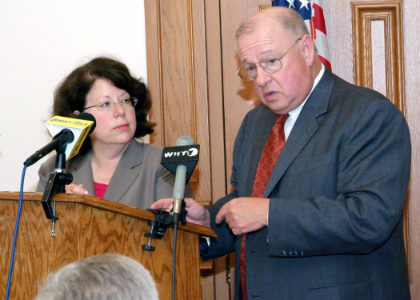
Legislation Will Help Increase the Acceptance of Zero Emission, Electric Vehicles
TRENTON – The Senate Environment and Energy Committee released two bills today that would encourage the use on zero-emission vehicles in the state, reducing the carbon emissions and pollution in New Jersey.
The first bill, S-1414, sponsored by Committee Chairman Senator Bob Smith, D-Middlesex and Somerset, would create a Clean Vehicle Task Force to identify regulatory and statutory obstacles to meeting the California zero emission vehicle requirements, which are required by law to be met in New Jersey.
“In order to meet New Jersey’s zero-emission car standards, in just four years, car retailers will be responsible for selling nearly 20,000 electric vehicles to state residents,” said Senator Smith. “The state’s leading environmental agency is behind the eight-ball in determining how we can rapidly increase the sales of these cars that will ensure a cleaner environment for future generations of New Jerseyans. This Task Force is not just desired but absolutely necessary to coordinate the planning, incentives and charging infrastructure that will be needed to create the demand for these vehicles.”
The bill would reaffirm to the Department of Environment Protection that the state must continue implementation of the California Low Emission Vehicle program. The bill also disallows the Task Force from recommending a discontinuation of California program.
In 2003, the state enacted the Clean Car Program requiring the state to adopt the California Low Emission Vehicle program. The federal Clean Air Act allowed for states to comply with either their regulatory emission standards or to use California’s more stringent standards. The California Low Emission Vehicle program sets average emission standards on fleets of cars sold by each car manufacturer in the state. The provisions of the program include a percentage of sales from low and zero emission vehicles in the marketplace that will continue to increase yearly.
The second bill, S-262, sponsored by Committee Vice-Chairwoman Senator Linda R. Greenstein, D-Middlesex and Mercer, would provide a substantial boost to the state’s electric vehicle recharging infrastructure. The bill would require the Department of Transportation to examine and promote the development of electric vehicle charging stations as part of any project financed by the Transportation Trust Fund Authority.
“After the Christie Administration’s decision last week to virtually ban Tesla’s sale of electric vehicles in New Jersey, proposed Tesla-installed vehicle charging stations may very well be delayed or completely scrapped,” said Senator Greenstein. “It is therefore incumbent on the Department of Transportation to begin to build the charging infrastructure we will need in the future, increasing consumer confidence in the electric vehicle industry to meet state standards.”
According to the US Department of Energy, as of March 14, 2014, New Jersey ranks 28th in the nation in the number of both public and private alternative-fuel pumps installed, with 215 electric charging stations and 29 compressed natural gas stations.
According to a 2006 state Department of Transportation report, New Jerseyans drive a total of 75 billion miles each year. The Senators note that without strictly reviewing and enforcing our state’s emission standards and without incentives for New Jersey residents to purchase low and zero emission vehicles, especially considering the high number of miles driven each year on New Jersey roads, the state will continue to have unhealthy air quality and will continue to contribute to worldwide climate change.
S-1414 was approved by the Senate Environment Committee with a vote of 4-1. It now heads to the full Senate for consideration. S-262, which now heads to the Senate Budget and Appropriations Committee for review, was approved by the Environment Committee with a vote of 5-0.

